 About GamePeople
About GamePeople
Subscribe to the Story Gamer column:![]() RSS or
RSS or
![]() Newsletter.
Newsletter.
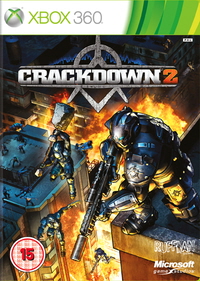
Format:
360
Genre:
Adventuring
Style:
Thirdperson
Singleplayer
Cooperative
Further reading:
Bioshock
Dead Space
Buy/Support:
Support Mark, click to buy via us...
Other GamePeople columnists have reviewed this from their perspective - huh?:
Family Gamer (360)
Soulful Gamer (360)
Returning Gamer (360)
Tech Gamer (360)
Dressup Gamer (360)
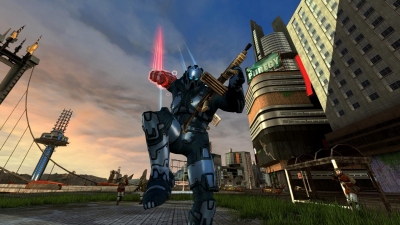
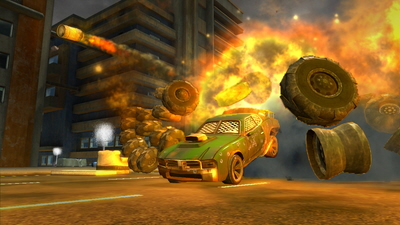
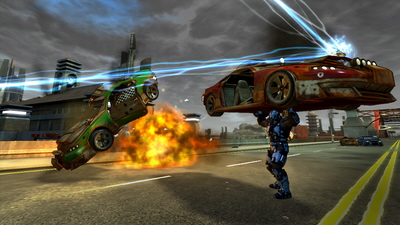
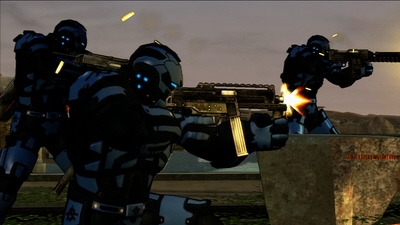

Further reading, films and books that create similar stories:
Crackdown 2 360 takes Agents back to a ruined Pacific City, but while super-powered crime fighting is as irresponsibly fun as ever, this sequel fails to advance either the series or its story.
Narration gets a bad rep these days. The voiceover on Blade Runner was stripped out for the Director's Cut, and the bombastic narration on old show's like Dragnet now comes across as a little quaint. For most visual media, an omnipresent voice leading through the story is too much 'tell' and not nearly enough show.
Games, however, have really taken to narration in recent years. Although it's woven into the plot through the in-story devices of one-way radios and audio diaries, games like Bioshock and Dead Space provide most of their story through narration. The visuals are mainly shootouts and explosions, and it's through the voices heard over the wire or on an audiolog that the player gets the depth of story.
No recent game has been quite as dominated by a single voice as Crackdown, with its omnipresent Voice of the Agency. While the genetically engineered super-cops are disposable non-characters - you can even swap their faces between respawns to no noticeable difference - the Voice of the Agency is the real character of the game.
Crackdown 2 wisely puts the Voice at the centre of the sequel. Not only do we get to see the Agency's Director in the opening cinematic - albeit only from the back, Dr Claw style - but there's more story specific narration throughout the game, as well as the usual context specific (and occasionally arbitrary) hectoring and abuse. Whatever you're doing, the Voice is always there, bellowing at you to do more.
It is a great vocal performance, and a great character, often genuinely funny. Accidentally killing 'peacekeepers' provokes a melodramatic 'That peacekeeper had a wife and family, perhaps you'd like to tell them what just happened', which made me laugh out loud even after several repetitions. The description of the Agency Supercar is also a genuinely hilarious bit of foul-mouthed hyperbole.
It is a great vocal performance, and a great character, often genuinely funny.
Further voices are added via audiologs that can be found, alongside the stat-boosting agility orbs, while exploring Pacific City. There's a Christian-Bale-a-like Agency officer reporting on routes into the strongholds of Cell (a terrorist group, the main human enemies), an anthropologist reporting on the non-human mutant Freaks, and a couple of others including the diaries of arch-baddy Catalina Thorne.
While these are a fun bit of texture, they reveal the shortcomings of the in-game story, and the limits on your Agent's ability to interact with the world. Pacific City may be a three-dimensional urban space of great character, but it's populated by repetitive soundbite-screeching AIs who drop into four categories: helpful peacekeepers, neutral citizens, gun-toting Cell members and savage mutant Freaks.
There's no way of interacting with any of these parties beyond 'kill' or 'don't kill'. Unlike the previous Crackdown, there aren't even any bosses or different grunt types to vary things up: there's a brief upward curve as Cell weapons get more explosive, and the Freaks get bigger and bigger, but there are no individuals amongst either group. The gang's of the previous game may have been ridiculous ethnic stereotypes, but at least they had some variety.
It doesn't progress the series' story enough: it neither deepens the world nor expands it.
There's a bit more satirical bite in Crackdown 2 than in 1, with the increasingly dystopian future more obviously and shamelessly the Agency's fault, but it effects the storytelling and game play not one bit: even if I wanted to rebel against the fascistic Agency and go join Cell, I had no option to do so. I could either follow orders, or wander off and perform side quests, but that was it.
Crackdown 2 is, in many ways, a very good game, but that's because it's a marginally improved version of its predecessor, a good game with a few rough edges. Players of the original Crackdown have been here before, and may find that the polish added to the series core mechanics isn't quite enough to justify a new purchase. Newcomers, however, will have a riot: there's still plenty of fun to be had exploring Pacific City and blowing stuff up.
Crackdown 2 has a great premise, and a clear central character in the bullying, ranting voice of the Agency, but it doesn't progress the series' story enough: it neither deepens the world nor expands it. Instead, it's just another day in Pacific City, with a slightly different set of baddies.
Good, but not quite good enough, Agent.



Mark Clapham writes the Story Gamer column.
"I love a good story. Games tell many different stories: the stories told through cut scenes and dialogue, but also the stories that emerge through gameplay, the stories players make for themselves."
Here are the games I've been playing recently:
© GamePeople 2006-13 | Contact | Huh?

|
Family Video Game Age Ratings | Home | About | Radio shows | Columnists | Competitions | Contact
With so many different perspectives it can be hard to know where to start - a little like walking into a crowded pub. Sorry about that. But so far we've not found a way to streamline our review output - there's basically too much of it. So, rather than dilute things for newcomers we have decided to live with the hubbub while helping new readers find the columnists they will enjoy. |
Our columnists each focus on a particular perspective and fall into one of the following types of gamers:
|